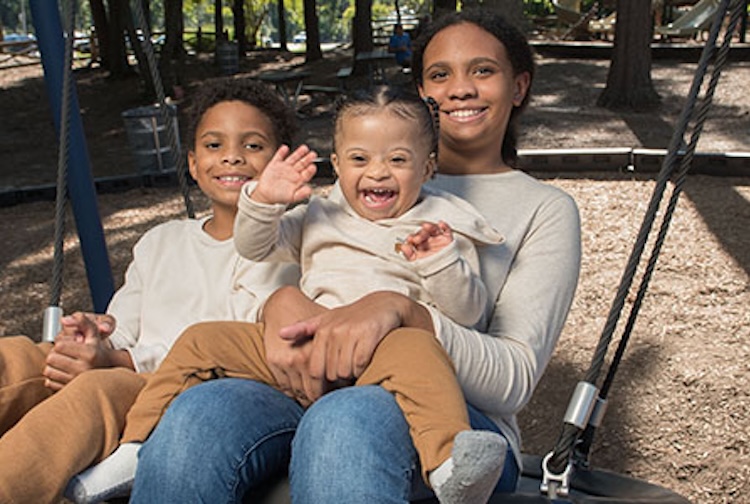
Donors and recipients reflect on power of organ donation
April 25, 2016


The Donate Life flag flies outside VCU Medical Center. After April, the flag will be raised whenever an organ donation occurs at VCU Health and the Hume-Lee Transplant Center from a living or deceased donor.
By Leha Byrd
University Public Affairs
804-828-7028
llbyrd@vcu.edu
Monday, April 25, 2016
After Heather Monger’s 18-year old brother died unexpectedly in 2012, he was honored as a deceased organ donor at the United Network for Organ Sharing Tree of Life Ceremony. The ceremony commemorates and recognizes families who have made the decision to donate a loved one’s organ, tissues or eyes to a recipient in need.
The event moved Monger to action.
“After seeing how many lives you can help by donating, I started researching the process,” she said. “I donated the left lobe of my liver at UVA Health Systems on June 3, 2015, and earlier this year I donated my left kidney at VCU Health.”
Monger’s sacrifice is one health organizations are hopeful others will consider, as living donation leads to better short- and long-term outcomes for transplant recipients, and helps minimize the number of people added to the national transplant waiting list every day. To help raise awareness for organ donation, living and deceased, Donate Life America designated April as National Donate Life Month in an effort to spearhead local, regional and national activities that encourage Americans to register as organ donors. The month is also an opportunity to celebrate the lives of those who have provided the gift of organ donation. According to Donate Life America, nearly 124,000 men, women and children are awaiting organ transplants in the United States, including 3,200 Virginians.
Marlon Levy, M.D., director of the VCU Health Hume-Lee Transplant Center, said organ donors are critical to saving lives and second chances.
“Organ donation is essential in that people who may not have any other chance of survival are given an opportunity to live, and with a better quality of life because of the transplantation of vital organs,” Levy said.
Medical advances have made the organ donation process less arduous for the donor in recent years. In the field of transplantation, Hume-Lee is the first center in the state of Virginia and surrounding states to offer robotic surgery for living donors. With this technology, surgeons manipulate robotic instruments through a state-of-the-art console that provides advanced, three-dimensional vision, precision and control. A robotic procedure was used for Monger’s surgery, which has as one of its benefits quicker recovery time, due to the limited amount of movement needed inside the abdomen because of robotic precision. Other benefits include less scarring and pain for donors.
“I was out of the hospital on the third day post-kidney donation, and I was back to classes one week post-donation,” said Monger, a University of Virginia student. “At the three-week mark, I felt completely back to 100 percent. I can honestly say that I've had flus that took me longer to recover from.”
Patti Dean was twice the recipient of liver donations at VCU Health and said her experiences motivated her to get involved in spreading awareness about the importance of organ donation. For the last nine years, she has been a community education coordinator for LifeNet, the Virginia Beach-based nonprofit organ procurement organization that provides facilitates and coordinates donation for heart, liver, kidney, pancreas, lung and other organs for transplant.
In addition to her experience she, too, was moved by the death of her brother, who had not specified his donor status before he passed away. If a person’s donor status is predetermined, their organs are more likely to be successfully placed for transplant .
“My brother died in 2001 and was not registered as donor so my family had to make the decision [of whether to donate his organs] that night. Then, in 2006 I needed a liver transplant,” she said. “I figured God didn't put me through all this for me to go back to being a bookkeeper."
Dean received her first liver transplant in Aug. 1, 2006, with her husband serving as the living donor. Dean developed blood clots that shut the liver down, and was soon in need of another transplant. Doctors gave her about 24 hours to live, she said, before she was notified that a deceased donor was a match. Her second transplant was one month and a day after her first.
Critical cases like hers and others are why National Donate Life Month is important, she said.
“This month helps in making people aware of how important it is just to make the decision, whatever their decision is – whether their decision is a yes or a no,” Dean said. “It’s important for them to make their own decision and let their family know. That way if something happens to them, they’re not leaving it up to their family to make the decision at the worst possible time.”
Monger, too, is hopeful that her act and this month will be a reminder to others of the value of organ donation. “The only thing I want from both of my recipients is for them to live their lives to the fullest, spend time with their loved ones, and help spread the word about organ donation,” she said.
 Heather Monger stands beside her brother's name at the National Donor Memorial at UNOS
Heather Monger stands beside her brother's name at the National Donor Memorial at UNOS




